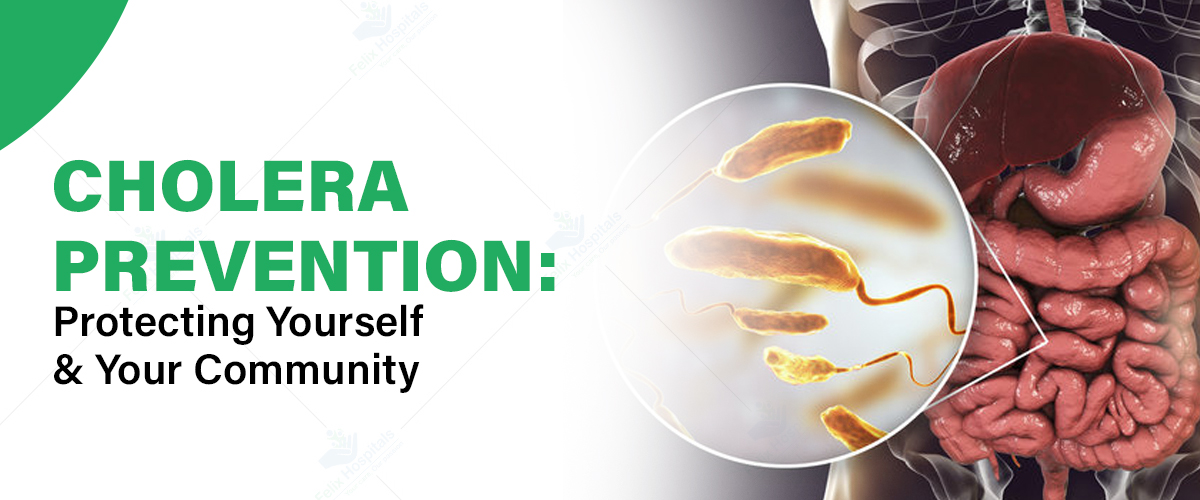
Subscribe to our

Cholera is a life-threatening disease that continues to pose a public health challenge in many parts of the world. While it may not be as widespread in developed countries, it remains a concern in areas with poor sanitation and access to clean water. At Felix Hospital, known as the best Cholera Hospital in Noida, our top specialists provide expert care in managing and preventing cholera and other gastrointestinal diseases. In this blog, we will take a deep dive into cholera—its causes, symptoms, and most importantly, how it can be prevented to protect yourself and your community from its devastating effects.
Stay Protected Against Cholera! Contact Us Today at +91 9667064100.
Cholera is an acute diarrheal illness caused by the bacterium Vibrio cholerae. It is usually spread through contaminated water or food, and it can cause severe dehydration due to the rapid loss of fluids. Without immediate treatment, cholera can be fatal within hours, especially in children and the elderly. The disease is prevalent in areas where sanitation conditions are poor, and clean water is scarce. Despite its severity, cholera can be easily prevented with proper hygiene practices, water treatment, and vaccination.
The primary cause of cholera is infection by the bacterium Vibrio cholerae, which thrives in contaminated water sources. The following factors contribute to the spread of cholera:
Travel to Endemic Areas: Individuals traveling to areas where cholera is common may be at higher risk if they consume untreated water or contaminated food.
Cholera symptoms typically manifest within 2 to 5 days after exposure to the bacteria. While some infected individuals may show mild or no symptoms, those who develop severe cholera can experience life-threatening dehydration. Key symptoms of cholera include:
Preventing cholera is crucial, especially in areas with poor sanitation and limited access to clean water. By adopting effective prevention measures, individuals and communities can reduce the risk of cholera outbreaks. Below are some strategies for cholera prevention:
Access to clean and safe drinking water is the cornerstone of cholera prevention. In regions prone to cholera outbreaks, it is essential to treat water from natural sources to eliminate harmful bacteria. Some ways to ensure water safety include:
Proper sanitation and hygiene are critical to preventing the spread of cholera. Ensuring that waste is disposed of properly and maintaining clean surroundings can drastically reduce the risk of contamination. Key practices include:
Vaccines can provide an additional layer of protection, especially in areas where cholera is endemic or during outbreaks. Two oral cholera vaccines (OCV) are currently available and are recommended for people living in high-risk areas or for travelers to cholera-prone regions:
While vaccination is not a replacement for proper hygiene and sanitation practices, it can help reduce the spread of the disease during outbreaks.
Public health campaigns and community-driven initiatives play a vital role in cholera prevention. Governments and organizations must work together to:
Improve Infrastructure: Long-term cholera prevention requires investment in infrastructure, such as building proper water supply systems, sewage treatment plants, and public toilets.
At Felix Hospital, we take pride in being the best gastro hospital in Noida, offering top-notch care for gastrointestinal diseases, including cholera. Dr. Jagatjot Singh Gill and Dr. Amrit Yog Datley, renowned gastroenterologists at Felix Hospitals, have extensive experience in treating cholera and other gastrointestinal infections. Dr. Gill and his team provide personalized care, utilizing the latest technologies and treatment methods to ensure the best outcomes for patients.
Take Control of Your Health Today! Book an Appointment Now by Clicking Here.
Cholera is a preventable disease, but it requires a collective effort from individuals, communities, and healthcare systems to eliminate its spread. By following proper hygiene practices, ensuring access to clean water, getting vaccinated, and working together to improve sanitation infrastructure, we can protect ourselves and our communities from cholera outbreaks.
At Felix Hospital, our dedicated team of specialists is committed to offering the best care for cholera prevention and treatment. Whether you need expert consultation or support from the best gastroenterologist in Noida, we are here to provide exceptional healthcare services tailored to your needs.
1. What is the most common cause of cholera?
Ans: Cholera is most commonly caused by consuming water or food contaminated with the bacterium Vibrio cholerae.
2. How can I protect myself from cholera when traveling to high-risk areas?
Ans: Avoid drinking untreated water, wash hands regularly, consume well-cooked food, and consider getting vaccinated before traveling.
3. Can cholera be treated at home?
Ans: Mild cases can be treated with oral rehydration solutions, but severe cases require immediate medical attention to prevent dehydration and shock.
4. Is cholera contagious from person to person?
Ans: Cholera is not typically spread through direct person-to-person contact but rather through contaminated water or food.
5. What should I do if I suspect I have cholera?
Ans: Seek medical help immediately. Early treatment with rehydration solutions and antibiotics can prevent complications.
6. How long does the cholera vaccine last?
Ans: Depending on the vaccine, protection can last between 2 to 5 years after the full dosage.
7. Can cholera be fatal?
Ans: Yes, cholera can be fatal if not treated promptly, especially due to severe dehydration.
8. What are the signs of dehydration in cholera?
Ans: Signs include extreme thirst, dry mouth, sunken eyes, rapid heartbeat, and low blood pressure.
9. Is there a cure for cholera?
Ans: Cholera can be effectively treated with rehydration solutions, and antibiotics may be used in severe cases.